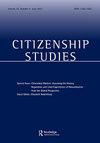Categorical boundaries: the political production of kinship and citizenship
IF 1.9
3区 社会学
Q3 POLITICAL SCIENCE
引用次数: 0
Abstract
ABSTRACT The article explores the multiple ways/layers in which “boundaries” shape contemporary life. To be a state is to have territory controlled by the state. A state that does not have formally recognized boundaries that are acknowledged by other states is a state in constant jeopardy. Modern states are committed to consolidating boundaries –even as boundaries are often fluid, dynamic, and changeable. Boundaries are foundational to categorical thinking. Categorical thinking is the assembling of items, events, situations, people, things into groups which are presumed to shave common characteristics in opposition to other groups. Categories are socially/culturally constructed. Their ascendency/institutionalization at particular points in time often leads to their naturalization over time, as if they are given in nature or have a seamless, continuous history. Modern states try to fix, stabilize, naturalize themselves as categories through boundaries. Citizenship is a form of categorical thinking, a form of boundary created, necessitated, by modern states. Citizenship determines who and how one gets to belong to a state; who the state claims; and who is entitled to claims on the state. Refugees are refugees because they lost the ability to live within the boundaries constructed by their state. Whether as a result of violence, forced migration, political persecution, or other means, they can no longer live within the territorial boundaries of the state of which they had been citizens or residents.绝对边界:亲属关系和公民身份的政治产物
本文探讨了“边界”塑造当代生活的多种方式/层面。成为一个国家就是拥有由国家控制的领土。一个没有正式承认而其他国家承认的边界的国家是一个经常处于危险中的国家。现代国家致力于巩固边界——即使边界经常是流动的、动态的和多变的。界限是分类思维的基础。分类思维是将物品、事件、情景、人、事物组合成一组,这些组被认为具有与其他组相反的共同特征。类别是社会/文化建构的。它们在特定时间点的优势/制度化往往会导致它们随着时间的推移而归化,就好像它们是自然赋予的,或者有一个无缝的、连续的历史。现代国家试图通过边界来固定、稳定、自然地将自己归类。公民身份是一种分类思维的形式,是现代国家所创造和需要的一种边界形式。公民身份决定了谁以及如何归属于一个国家;国家主张谁;谁有权对国家提出索赔。难民之所以成为难民,是因为他们失去了在国家划定的边界内生活的能力。无论是由于暴力、强迫移徙、政治迫害或其他原因,他们都不能再在其曾经是其公民或居民的国家的领土边界内生活。
本文章由计算机程序翻译,如有差异,请以英文原文为准。
求助全文
约1分钟内获得全文
求助全文
来源期刊

Citizenship Studies
POLITICAL SCIENCE-
CiteScore
3.60
自引率
11.10%
发文量
85
期刊介绍:
Citizenship Studies publishes internationally recognised scholarly work on contemporary issues in citizenship, human rights and democratic processes from an interdisciplinary perspective covering the fields of politics, sociology, history and cultural studies. It seeks to lead an international debate on the academic analysis of citizenship, and also aims to cross the division between internal and academic and external public debate. The journal focuses on debates that move beyond conventional notions of citizenship, and treats citizenship as a strategic concept that is central in the analysis of identity, participation, empowerment, human rights and the public interest.
 求助内容:
求助内容: 应助结果提醒方式:
应助结果提醒方式:


